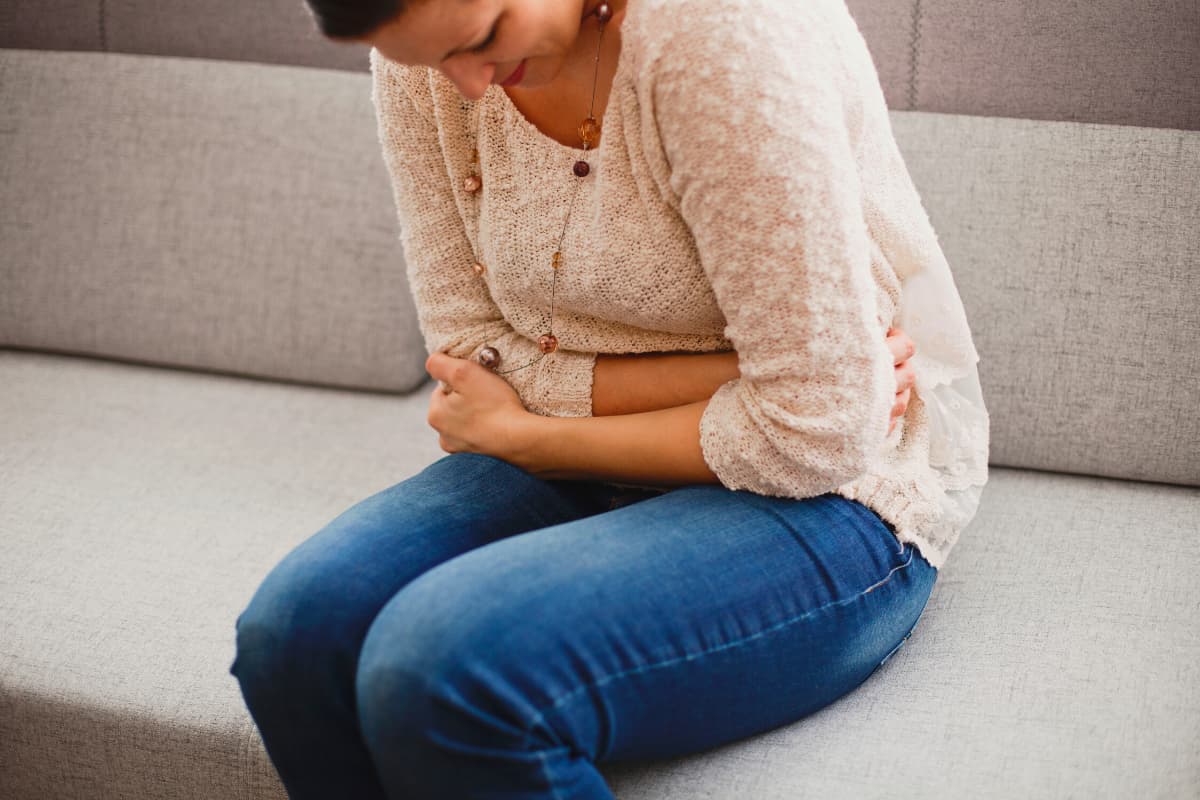Can Menopause Cause Nausea?

You might be surprised when you enter menopause and start experiencing nausea and other gastrointestinal issues. This is not talked about much, so it’s possible you don’t know that nausea is a relatively common side effect of menopause. Read on to learn more about the hows and whys of nausea during menopause and what you can do about it.
Is Nausea a Menopause Symptom?
It certainly can be, and there are several potential causes. Both estrogen and progesterone levels drop dramatically in menopause, and it is known that low progesterone levels can cause gastrointestinal (GI) problems. The research shows that low progesterone slows down gut motility, meaning digestion slows down. Delayed gastric emptying can cause nausea in some people.
Low estrogen and high cortisol levels in menopause cause an increase in adrenaline. This can also affect the digestive system and lead to nausea.
Experts have also determined that hot flashes caused by low estrogen can trigger nausea in about 5% of women. It is thought to be caused by rapid changes in blood pressure that take place during a hot flash.
Anybody might develop GI symptoms in menopause, but research suggests that non-Hispanic white women are most at risk.
How Long Does Nausea Last in Menopause?
Don’t panic. You won’t feel nauseous for the rest of your life. There is almost no research available on this topic, so we must rely on anecdotal data to get an idea of what to expect. It appears that nausea is most likely an issue during perimenopause and the early stages of menopause. For most people, GI issues will self-resolve as your body adjusts to its new hormone levels.
Perimenopause can last for several years, however, and living with GI issues for that long may not be something you’re willing to do. Luckily, there are ways to alleviate and prevent nausea in menopause.
Preventing Nausea During Menopause
Figuring out what works best for you might take some trial and error, but there are some simple steps you can take to improve your GI symptoms.
Avoid certain foods and beverages
Some people find that spicy foods, alcohol, hot drinks, and caffeinated beverages worsen their nausea. Be a detective and test out if eliminating any of these things from your diet offer you some relief.
Eat lighter meals earlier
Eating late in the evening, especially a heavy meal, can upset your stomach even the next day. Eating a light, easy-to-digest meal earlier in the evening may help. As a bonus, this strategy can also help with weight management.
Manage hot flashes
Small lifestyle adjustments can help manage hot flashes. Some simple things you can do are dress in layers, avoid alcohol and caffeine, maintain a healthy weight, choose a healthy diet, and sleep in a cool room. Tracking your triggers can also help identify the root cause of hot flashes and help you make behavioral changes.
Give Hormone Therapy (HT) a try
HT can stop or significantly minimize hot flashes, which may be helpful if your nausea is hot flash related. Counterintuitively, HT can cause nausea in some people. If this is a treatment option you’re interested in, be aware that there’s a chance it won’t be the cure-all you’re expecting. Talk to your healthcare provider about the risks and benefits of HT, or use the handy hormone therapy decision support tool in the Midday app.
Holistic Remedies for Nausea During Menopause
Phytoestrogens
Phytoestrogen-rich foods like soy have been shown to minimize hot flashes in menopausal women, and less severe and frequent hot flashes can lessen nausea.
Also, because phytoestrogens weakly mimic estrogen in the body, they may help to lower cortisol and adrenaline production and lessen their impact on your GI system.
Cinnamon
Cinnamon has been shown to relieve nausea and GI distress. When taken in high doses, it can interact with some medications, so use it in moderation.
Ginger
Ginger has been used since ancient times for a multitude of medicinal purposes. Science has backed up its efficacy in treating nausea and vomiting. Adding ginger to your diet can be a cheap, safe, and effective way to combat nausea in menopause. Ginger teas are an easy way to get started.
Peppermint
Experts say that peppermint, specifically the smell of peppermint, is effective in reducing post-surgical nausea. Adding a little aromatherapy with peppermint oil into your life can help your stomach feel more settled.
Vitamin B6
Supplementing with vitamin B6 might ease some of your nausea. Studies have shown a positive impact of B6 supplementation on pregnancy-related nausea. Although you’re not pregnant, it may be worth a shot to try B6. Talk to your healthcare clinician first and see if it’s a good choice for you, as supplements can interfere with medications you may be taking.
Final Thoughts
Lifestyle and diet can dramatically impact your experience of menopause-related nausea, and there are natural and pharmacological ways to address your GI issues.
It’s always a good idea to discuss your symptoms with your clinician to work together to develop the best treatment strategy for you. It’s not okay for you to live with nausea, and you don’t have to.
Looking for more expert support on menopause symptoms? Download Midday from the App Store or visit us at Midday.Health.
Jennifer Turkyilmaz, RN, BSN, is a medical writer who worked for many years in women’s health as a high-risk pregnancy nurse. She is also a newly menopausal woman who wishes she had known more about what to expect before it happened to her.
Sign up for more unique women’s health content
By submitting this form, you agree to the Lisa Health Privacy Policy and Terms of Use


